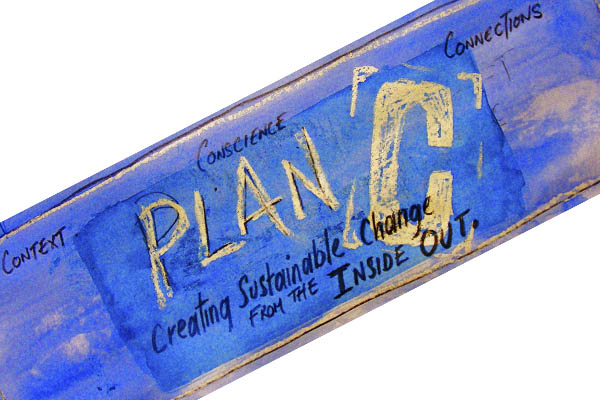Spitting on A Forest Fire

Ethical consumers, says a small story in the Guardian, are more likely to indulge in selfish behaviour than those buying conventional products and may even be more likely to steal and lie.
The claim is based on a study by researchers at University of Toronto’s Rotman School of Management, which used a series of computer games to test the theory that green consumers were more altruistic and ethical than non-green consumers.
In one test participants were given $6 to spend in online shops and to share with other participants. Those who browsed, but did not buy, in a store with green products shared more money than those who had browsed the store with conventional products. But those who actually made purchases from a green store tended to share less money with others than those who bought from the conventional store. Thus the selfishness.
In another experiment participants were asked to look at a split screen on a computer. An image of dots would flash up quickly on the screen and the goal was to identify which side had more dots. Guess right and you could take money out of an envelope containing $5 in loose change. Green shoppers were more likely to reward themselves for being right – even if they weren’t – and came away with on average an extra 83 cents in their pockets. Thus the lying and stealing.
One has to wonder at the timing of this story in a major newspaper, what with all this data about supposed climate change scepticism floating around. In fact, this study was published in August 2009 and has been available online since at least October. So why now?
But let’s save that analysis or another day and get back to those selfish green consumers…
Is it better to buy green products than planet-destroying ones? Yes. Probably. Sort of. But the notion of a ‘green consumer’ is, itself, something of an oxymoron since most ‘greens’ recommend shopping less and even opting out of the conventional economic system whenever possible. Such recommendations include time banks, LETs schemes, local and alternative currencies (including gold coins) and simple person-to-person barter, as well as adopting a ‘mend and make do’ attitude. ‘Green’ shoppers generally don’t represent such values and beliefs. In fact, green shoppers are more likely to represent a niche group within the larger body of our consumer society, rather than a subgroup of the larger body of environmentalists. And consumer society is inherently selfish.
But why, possibly, would green a consumer be more selfish than those buying conventional products? Likely the green shopper is reacting to a deeper knowledge that this business-as-usual response to crisis is the economic equivalent of spitting on a forest fire. When you feel ineffective you will do anything to feel powerful again, including stealing and cheating. In the wider human community people commit such crimes precisely to feel powerful and in control of some aspect of their lives.
It may be hard to square this view with news stories of the phenomenal growth of ethical consumerism. But when you are starting from zero, almost any growth can seem phenomenal. The bottom line is that ethical consumerism makes up such a small percentage of actual overall consumerism as to be a meaningless blip on economic and environmental radar. According to the Co-operative Bank’s annual Ethical Consumerism Report 2009 whilst green spending has continued to rise and UK consumers now spend more than £6bn per annum on products with an ethical pedigree, this amount still accounts for less than one percent of total household expenditure.
To really get to grips with this study we need ask what is going on under the surface. The authors of the study framed the selfish actions of the green consumers as a kind of exaggerated sense of entitlement, a license to do bad.
Certainly the green consumer can be seen as an eco-narcissist; someone who buys to be seen to be green. Through shopping they indulge in the biggest ego-stroke of all: the fantasy that they are saving the world. So why should we be surprised or even disappointed that such people might lie and cheat on a computer game or express a distorted sense of entitlement when it comes to being rewarded for ‘good’ behaviour?
In psychology what drives the kind of slingshot effect seen in this study, where ‘bad’ behaviour follows closely on the heels of ‘good’ behaviour, would be linked to shadow material. The shadow is all the stuff that we repress, not just our ‘bad’ thoughts and feelings, but all our greatest unlived potential, as well as things we know but try not to think about or feel anything for because it is too painful or too complicated. Every time we slip into this kind of unexamined consciousness – the very consciousness that allows a consumer society to flourish – the shadow will rise up and slap us the head.
A green consumer in quiet moments of reflection (providing they have such things) may wonder why, if they are making the ‘right’ choices, the world is still so ‘wrong’. The frustration at this ‘wrongness’ – which is often unexpressed – may lead to an overwhelming sense of resentment, anger and grief; to the need for soothing of some sort, the need for recognition of every effort however minor, and the unbearable feeling that nothing they do matters anymore. And if nothing matters anymore, why not steal and cheat and lie?
No matter how much we seek to celebrate it, the truth about green shopping is that it makes us think less, not more, about the issues. Think of green consumerism like a fat-free cookie. We assume it’s good for us because it doesn’t have any fat. In fact, that cookie seems so wonderfully guilt-free, even healthy, that we have no problem in hoovering up an entire box or three in one sitting, oblivious to the number of calories we are consuming and their eventual effect on our health.
It’s the same with green shopping. We buy more and more of this stuff only to find only to find that our lives and our homes are still overwhelmed with junk we don’t need. And in the world ‘out there’ nothing has changed.
In the end it’s hard to see what can really be gained from this bizarre series of tests. It’s almost impossible to measure morality in a lab. It may even be that the green shoppers (university students after all) lied and cheated more because they spent so much on ethical goods that they couldn’t even afford a cup of Fairtrade coffee.
In a fairer world, all goods would be ethical goods, the words ‘retail’ and ‘therapy’ would never be crunched together and we’d all be spending a lot less time worrying about keeping up with the Eco-Smythe-Joneses. We would, as Duane Elgin so eloquently suggests in his book Voluntary Simplicity, simplify our outer world in order to facilitate a much richer inner world and studies like this would become even more redundant than they are today.
Originally posted at Plan C.
© Pat Thomas 2010. No reproduction without the author’s permission.












